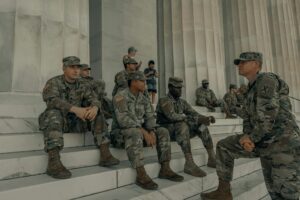
A Fight for Accountability in the War Zone
When Specialist Winston Tyler Hencely was catastrophically injured by a 2016 suicide bombing at Bagram Airfield, he sought justice through a state-law negligence suit against the defense contractor Fluor. His claim was simple: the company failed to supervise a subcontractor whose employee allegedly built and detonated the bomb.
But federal courts dismissed his case, ruling that the Federal Tort Claims Act’s combatant-activities exception and related federal interests preempt any state-law negligence claims tied to wartime operations. Now, in Hencely v. Fluor (No. 24-924), the U.S. Supreme Court will decide whether those immunity doctrines reach private contractors.
The Legal Question
At stake is whether the FTCA’s combatant-activities exception—which by its text shields the United States from liability for “claims arising out of the combatant activities of the military … during time of war” (28 U.S.C. § 2680(j))—also blocks suits against private contractors.
Hencely’s lawyers argue that the statute does not extend that far. They contend his claim concerns ordinary negligence, not battlefield decision-making. Fluor and the U.S. government counter that any tort case stemming from a war-zone base would entangle courts in military judgments, requiring preemption of state law to protect national security.
Why It Matters to Service Members
Because the Feres doctrine already bars active-duty personnel from suing the United States for service-related injuries, the only possible avenue for redress is often a suit against private contractors. If the Supreme Court upholds broad preemption, injured troops and their families could be completely without remedy—unable to sue either the government or its contractors, even for clear negligence in supervision, maintenance, or site safety.
That outcome would create what veterans’ advocates call a “remedy-free zone”: a world where those who serve in combat are left without any civil accountability for harm caused by negligent government partners.
Balancing Accountability and Military Deference
The Court must navigate the line between ensuring accountability and respecting the independence of military operations. Critics warn that expanding immunity invites careless contracting and removes incentives for safety. Supporters argue that allowing juries to review wartime conduct could second-guess the military and disrupt federal prerogatives.
However the Court rules, its decision will define the reach of contractor immunity in modern warfare and determine whether service members can still seek justice in civilian courts when contractor negligence contributes to their injuries.
Key Legal References
- Federal Tort Claims Act, 28 U.S.C. § 2680(j): https://www.law.cornell.edu/uscode/text/28/2680
- Feres v. United States, 340 U.S. 135 (1950): https://supreme.justia.com/cases/federal/us/340/135/
- Boyle v. United Technologies Corp., 487 U.S. 500 (1988): https://supreme.justia.com/cases/federal/us/487/500/
- SCOTUS Docket, Hencely v. Fluor, No. 24-924: https://www.supremecourt.gov/search.aspx?filename=/docket/docketfiles/html/public/24-924.html
- Fourth Circuit opinion (Oct. 30 2024): https://law.justia.com/cases/federal/appellate-courts/ca4/21-1994/21-1994-2024-10-30.html
- CRS Legal Sidebar LSB11364 (Sept. 12 2025): https://www.congress.gov/crs-product/LSB11364
- Public Citizen case page: https://www.citizen.org/litigation/hencely-v-fluor-corp/
- Bloomberg Law coverage: https://news.bloomberglaw.com/federal-contracting/supreme-court-will-review-soldiers-bomb-claims-against-fluor
Disclaimer
This article is for informational purposes only and does not constitute legal advice. Reading or sharing this post does not create an attorney–client relationship. Service members facing similar issues should consult qualified counsel familiar with military and federal tort law.
About the Law Offices of David P. Sheldon, PLLC
Based in Washington, D.C., the Law Offices of David P. Sheldon represents service members, veterans, and federal employees worldwide in courts-martial, correction-board petitions, security-clearance matters, and federal employment disputes. Learn more at www.militarydefense.com.
